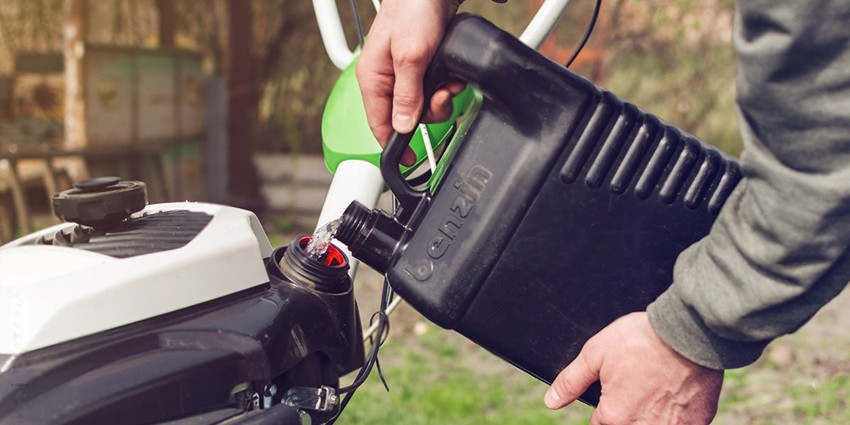All products were chosen independently by our editorial team. This review contains affiliate links and we may receive a commission for purchases made. Please read our affiliates FAQ page to find out more.
Home » Lawn Mowing » What Type of Lawn Mower Oil Should I Use?
When it comes to maintaining your lawn mower, one of the most crucial aspects to consider is the type of oil you use. The right oil not only ensures your mower runs smoothly but also extends its lifespan. With various types of oils available, choosing the right one can seem daunting. This article will guide you through understanding lawn mower oil, its types, and its applications, ensuring your mower stays in top condition.
Key Takeaways
- Understanding Lawn Mower Oil: Importance of selecting the right oil for efficiency and longevity.
- Types of Lawn Mower Oil and Their Applications: Insights into 10W-30, 5W-30, and SAE 30 oils and their best use cases.
- How Much Oil Does Your Lawn Mower Need? Guidelines for oil capacity in different mower types.
Understanding Lawn Mower Oil
Lawn mower oil plays a pivotal role in the efficient operation of your mower. It lubricates the engine, reducing friction between moving parts, which in turn minimizes wear and tear. This lubrication is vital for the engine’s longevity and helps in maintaining its performance over time. There are three primary types of oil used in lawn mowers: 10W-30, 5W-30, and SAE 30. Each type has its specific applications and benefits, tailored to different operating temperatures and engine designs. Read our guide to lawn mowers here.

Types of Lawn Mower Oil and Their Applications
10W-30
This oil type is known for its versatility across various temperature ranges, making it a popular choice for lawn mower engines. It provides excellent lubrication during cold starts, reducing the effort needed to start the mower in cooler temperatures. However, it’s worth noting that 10W-30 can lead to higher oil consumption, especially in warmer weather. This means you might need to check and top up the oil more frequently than with other types.
5W-30
Similar to 10W-30, 5W-30 oil works well in a wide range of temperatures but has a slightly lower oil consumption rate. This makes it a cost-effective option for those looking to maintain their lawn mower without the need for frequent oil top-ups. It’s particularly suited to colder climates, providing reliable performance even on chilly mornings.
SAE 30
SAE 30 is ideal for warmer temperatures and is the go-to oil for many lawn mower owners during the summer months. It offers stable viscosity at high temperatures, ensuring consistent engine lubrication and performance. Unlike multi-grade oils (like 10W-30 and 5W-30), SAE 30 maintains its thickness throughout its use, leading to less oil consumption and fewer top-ups.
Table 1: Comparison of Lawn Mower Oil Types
| Oil Type | Temperature Suitability | Oil Consumption | Best Used In |
| 10W-30 | All temperatures | Higher | Cooler climates, versatile use |
| 5W-30 | All temperatures | Lower | Colder climates, economical |
| SAE 30 | Warm temperatures | Moderate | Summer months, stable performance |
How Much Oil Does Your Lawn Mower Need?
The amount of oil your lawn mower requires depends on its type and engine size. Most rotary lawnmowers will need about 20 ounces of oil from empty, while ride-on mowers might require 50-60 ounces to fill up. It’s crucial to pour the oil slowly and allow it time to settle, ensuring accurate measurement and preventing overfilling, which can lead to engine damage.

Table 2: Lawn Mower Oil Capacity
| Mower Type | Oil Capacity |
| Rotary Mowers | 20 ounces |
| Ride-on Mowers | 50-60 ounces |
When adding oil, always refer to your mower’s user manual for specific recommendations regarding the type and amount of oil to use. This ensures you’re providing the best care for your mower, tailored to its design and operational needs.
Changing Lawn Mower Oil: Frequency and Steps
When to Change Your Lawn Mower’s Oil
Your lawn mower’s oil should be changed at least once a year, ideally in the spring before the mowing season begins, or after every 50 hours of use. This frequency ensures that your mower’s engine is protected and running smoothly throughout the season. Regular oil changes remove contaminants that can cause wear and tear on the engine, thereby extending the life of your lawn mower.

Step-by-Step Guide to Changing Oil
- Prepare your mower: Ensure the mower is on a flat surface and the engine is cool.
- Drain the old oil: Remove the drain plug and let the old oil flow out into a disposal container. Some models may require tilting the mower to drain the oil from the fill port.
- Replace the drain plug and refill: Once drained, replace the plug and slowly add new oil to the recommended level.
Table 3: Oil Change Steps
| Step | Action |
| Preparation | Ensure mower is cool and on a flat surface |
| Drain Old Oil | Remove drain plug, tilt if necessary |
| Refill | Replace plug, add new oil to recommended level |
Selecting the Right Oil for Your Lawn Mower
Choosing the right oil for your lawn mower is essential for its performance and longevity. The oil type should be based on the manufacturer’s recommendations, which consider factors like engine design, operating temperatures, and environmental conditions.

Factors Influencing Oil Choice:
- Viscosity: The oil’s thickness and flow at different temperatures.
- Climate: The temperature range in which the mower will be used.
- Mower Type: Different engines require specific oil types for optimal performance.
Table 4: Factors Influencing Oil Choice
| Factor | Description |
| Viscosity | Thickness and flow of oil |
| Climate | Operating temperature range |
| Mower Type | Engine design and requirements |
Register for our latest in-depth reviews and product round-ups from the experts.
Enter your email address below to receive our monthly review emails.
By entering your details, you are agreeing to our terms and conditions and privacy policy. You can unsubscribe at any time.
Frequently Asked Questions
The best oil for a lawn mower depends on the engine type and the climate in which it operates. Generally, SAE 30 is suitable for warm temperatures, while 10W-30 and 5W-30 are better for varying and colder temperatures, respectively.
Yes, you can use car oil in your lawn mower as long as it meets the engine’s viscosity requirements. However, always check the manufacturer’s recommendations before using any oil.
To check the oil level, remove the dipstick, wipe it clean, insert it back without screwing it in, and then remove it again to check the level. The oil should be between the high and low marks.
Using the wrong oil can lead to increased wear and tear, reduced engine efficiency, and potentially cause engine damage. Always use the recommended oil type for your mower.
A passionate plant enthusiast on a mission to turn every space into a blooming haven. With a love for all things botanical, I'm your gardening guide, sharing quick tips, the joy of nurturing plants, and the belief that every day is a great day to garden. Join me in cultivating a thriving garden paradise—we'll sow, grow, and flourish together in this green revolution!








